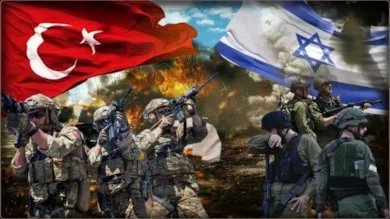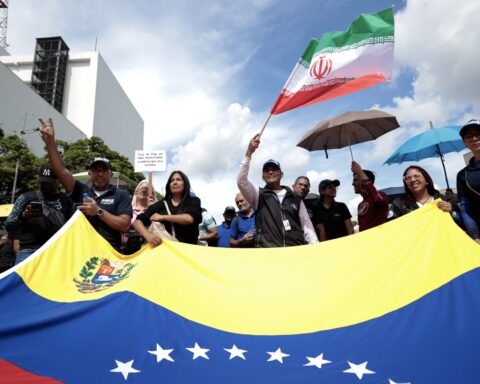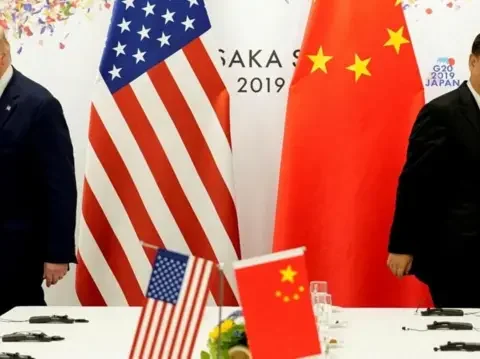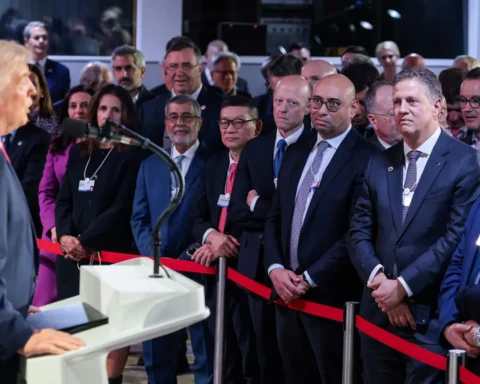Israel and Turkey can advance their long-term interests through cooperation rather than confrontation.
Since the fall of president Bashar al-Assad in December 2024, analysts have increasingly warned that Israel and Turkey – two countries with a strained diplomatic history over the past 15 years – are at odds over Syria’s future. Without proactive engagement, their conflicting interests could trigger an unintended military escalation.
The same voices argue that the first step to preventing such a scenario is the establishment of a reliable communication channel between Jerusalem and Ankara to reduce tensions and avoid costly miscalculations.
Dialogue is the minimum requirement for avoiding disaster. The skies over Syria have long been the site of tragic confrontations, and the region remains dangerously unpredictable. While calls for Israeli-Turkish dialogue – facilitated by Azerbaijan or another third party – are a welcome starting point, they are currently focused on addressing short-term, operational considerations. This is a low bar for two states that have enjoyed formal diplomatic relations since 1949 and share a vested interest in regional stability. Israel’s aim should be more ambitious: to fully restore diplomatic and economic ties with Turkey.
To move toward this goal, Israel should implement a series of confidence-building measures that can lay the foundation for a more constructive, forward-looking relationship with Ankara.
A deconfliction mechanism
The first and most urgent step is the creation of a deconfliction mechanism that clearly delineates military red lines in Syria. This would involve setting up a secure hotline or a regular system of communication between Israeli and Turkish military officials to prevent the accidental convergence of forces in sensitive areas. Over time, this mechanism could evolve to include mutual understandings regarding operational zones and airspace management.
However, deconfliction talks – which have been ongoing since mid-April – should not stop at the technical level. It must open the door to broader discussions about the post-Assad regional landscape. Both sides need to articulate their national security priorities and explore possibilities for cooperation in containing Iranian influence, curbing arms smuggling, and countering the drug trade.
Both Israel and Turkey have publicly expressed a desire to avoid direct conflict. Establishing a robust deconfliction mechanism that paves the way for future joint strategic planning is the most concrete way to honor that commitment.
The new Syrian government
In parallel with its diplomatic outreach to Turkey, Israel should actively engage with Syrian president Ahmed al-Sharaa. These exploratory talks have already begun, with a secret channel reportedly facilitated by the United Arab Emirates and one meeting in Baku with the participation of Israeli, Syrian, and Turkish representatives.
Negotiations will be complicated – potentially addressing contentious issues such as Hezbollah’s access to Syrian territory, Israel’s military operations in southern Syria, and the protection of minorities, such as the Druze and Kurds – nonetheless, they present a critical opportunity to reshape regional perceptions and policies.
Tactically, engagement with Damascus helps counter the prevailing narrative in pro-government Turkish media, which claims that Israel favors a fractured and decentralized Syria. Strategically, it could reduce Ankara’s outsized influence over Syrian affairs and pave the way for constructive Israeli-Turkish discussions about Syria’s post-war reconstruction.
If Israel and Turkey share a mutual interest in promoting a stable, sovereign Syria that limits Iranian and Russian influence and curtails the operations of extremist groups, this raises an important question: Could they – in coordination with the US, EU, and Gulf states – collaborate to develop conditional frameworks for easing international sanctions, thereby opening the door for Syria’s reconstruction? Can they work together with Washington in order to ensure that future withdrawals of US troops are coordinated with America’s regional partners?
Syria’s uncertain trajectory poses significant security challenges for both Israel and Turkey. As indicated following US President Donald Trump’s historic meeting with Sharaa in Riyadh, the Syrian government must address its myriad domestic challenges before joining the Abraham Accords. Still, establishing a diplomatic track with Damascus is an essential step for any long-term regional realignment to be realized. At the very least, it would signal to Ankara that Israel is serious about promoting regional stability and is willing to pursue coordinated, proactive measures to that end.
Economic ties
These steps – deconfliction with Turkey and diplomatic outreach with Syria – could pave the way for the restoration of the robust bilateral trade relationship that existed before May 2024, when Turkey suspended economic ties in response to Israel’s war against Hamas. That move, while ostensibly a foreign policy decision, was largely driven by domestic political pressures on Turkish President Recep Tayyip Erdogan and hasn’t borne much fruit.
Turkey continues to struggle with high inflation, volatile currency fluctuations, and widespread economic uncertainty. These factors have weakened investor confidence and downgraded the country’s credit ratings. The trade boycott against Israel has had limited practical impact, and Turkish officials have already hinted that economic relations could resume once humanitarian aid corridors in Gaza have been reestablished.
Restoring commercial ties would yield tangible benefits for both countries and could also extend economic advantages to the broader region. Joint ventures and cross-border projects involving Israeli and Turkish companies could directly or indirectly support the economies of the Palestinian Territories, Syria, and Jordan – as long as the two governments can once again separate their political disputes from economic cooperation.
Turkey and the Palestinians
The steps outlined above will require time, patience, and commitment from both sides. If managed effectively, they could serve as a platform for Israel and Turkey to address a broader range of issues, including their differing perspectives on the Palestinians.
Israel’s relationship with the Palestinians and Erdogan’s decision to embrace Hamas lies at the heart of bilateral tensions. As long as Erdogan and Prime Minister Netanyahu remain in power, this divide may remain unbridgeable. Even after one or both of them exit the political stage, Israel and its regional allies are unlikely to welcome Turkish involvement in Gaza’s reconstruction or Palestinian domestic affairs.
Therefore, the most realistic near-term goal is for Israel and Turkey to prioritize resolving their differences in Syria and to use any resulting progress as a foundation for engaging in more respectful dialogue about the Palestinian issue.
Still, the path to normalization must be laid now. If both sides can recognize that their long-term interests – regional security, economic growth, and connectivity – are better advanced through cooperation than confrontation, then mediation over military deconfliction today can open the door to broader and more meaningful engagement tomorrow.
*The writer is a senior policy fellow at the Mitvim Institute, a visiting fellow at the German Marshall Fund, and director of undergraduate studies at Notre Dame Jerusalem.
Source: https://www.jpost.com/opinion/article-854835






